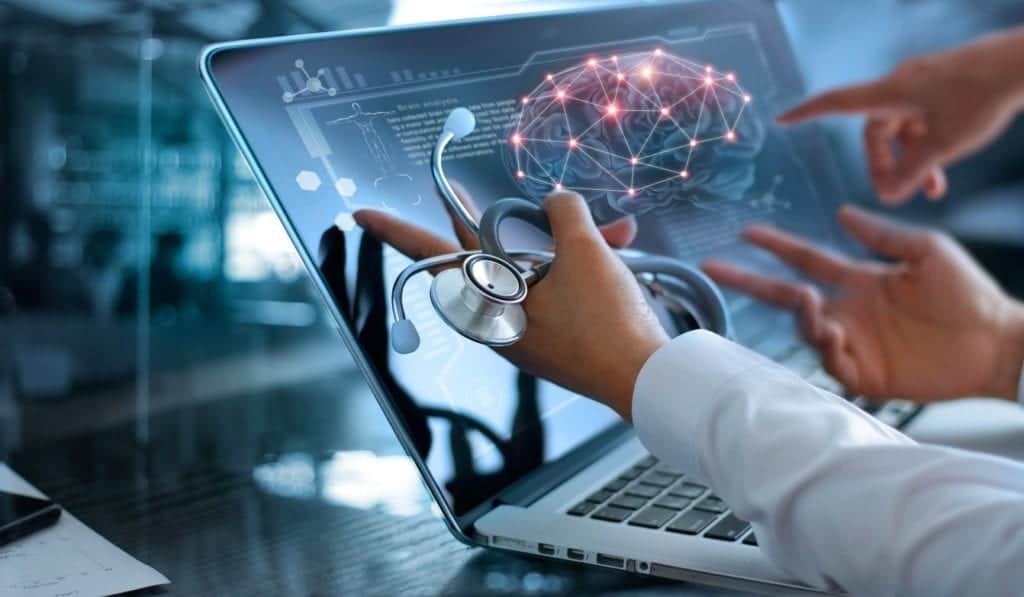- The healthcare industry is changing with the introduction of new technology. Technology is not only changing the way we provide care but also how we are reimbursed for care. Technology has changed our approach to health and wellness by providing new ways to measure, monitor, and manage the vast amount of data that is collected daily. New technologies are being developed, tested, and implemented at a rapid pace. We are still in the early stages of change and it’s not always easy to predict how these changes will affect us as patients or providers. Advances in digital healthcare technologies like AI, 3D printing, VR/AR, nanotechnology, and robots are paving the way for the future of medicine to be built right before our eyes. We need to learn about the most recent developments to control technology, not the other way around. The future of medicine depends on working with technology and clinicians to adapt to changes in the healthcare sector and stay relevant for years to come. Perhaps you are worried that AI and machines will supplant medical professionals like doctors, nurses, and other staff members in the workforce. You might be concerned that AI will take over the world in a few years. All of them are hoaxes, half-truths, and other dystopian images that serve as a more stylish method to present alternative information regarding the state of healthcare. The fear of the future unknowns and what can befall us, however, is what unites all these queries most importantly. Nobody can stop the advancement of technology. The power of digital technologies will eventually impact every aspect of our life. So, we must allow ourselves to remain open to the idea that technology might alter the world as we know it.
Humans and technologies demanding better healthcare
Many people may consider technology to be the sole answer. They believe that if we keep up with new technology and adopt it, it will only be for our good and improve our lives. If the “two steps ahead of it” criterion is adhered to, the interaction between technology and people has the potential to be very beneficial. Digital technology in healthcare and medicine has the potential to advance underperforming healthcare systems, provide quicker, less expensive, and more effective cures for diseases (such as AIDS or Ebola), and level the playing field between patients and medical professionals. Technology may help us lead healthier lives and foster thriving communities. There is a common proverb that states, “One has to be a master of his own house.” It is crucial to modify our perspective on health, healthcare, and medicine as we usher in the future by using these technologies to improve our health.
So, how would it appear? In this post, we will examine ten ways that medical technology is influencing healthcare.
- Artificial Intelligence
Healthcare is about to undergo a complete change thanks to artificial intelligence (AI), a potent technology. AI algorithms can create treatment plans, create medications more quickly than any doctor currently practicing, and even identify cancerous and non-cancerous tissue samples with the ability to mine medical information. Atom wise searches a library of molecular structures for treatments using supercomputers. The start-up, which debuted in 2015, developed a virtual search for secure, currently available medications that may be redesigned to treat the Ebola virus. Two medications that the company’s AI algorithm indicated would lessen Ebola’s infectiousness were discovered. Recently, Google’s DeerMind developed an AI for analyzing breast cancer. The innovative system surpassed human radiologists at detecting breast cancer by 11.5% on pre-cleared data sets. These two companies are only two of the countless others that will soon use AI to improve healthcare. These companies serve as real-world examples of what we may expect in the future if we permit AI in healthcare, including disruption of the healthcare sector, the development of novel medications, and the mining of medical data.
- Virtual Reality
Virtual reality is altering both the lives of medical professionals and patients (VR). While recovering in a hospital bed in the future, you might visit Madrid or your home country, or you might watch procedures as if you were the one performing them! In a variety of settings, including the training of aspiring surgeons and the practice of surgery by seasoned surgeons, virtual reality (VR) is used. These software programs are being created by companies like Osso VR and ImmersiveTouch, and so far, the results are promising. A recent study found that surgeons who underwent VR training outperformed their traditionally trained counterparts by 230% overall. These technological developments are also helping patients, and one area where this is evident is in pain management. Women are given VR headsets to wear during labor discomfort so they can picture a comforting scene. When using VR as a stimulus, patients with diagnoses of cardiac, neurological, gastrointestinal, and post-surgical pain have demonstrated a reduction in their pain levels. A 2019 pilot study found that patients who underwent surgery experienced less anxiety and pain overall and a better overall healthcare experience.
- Augmented Reality
In contrast to virtual reality (VR), augmented reality (AR) allows users to see information as quickly as possible without losing sight of the real world. These distinguishing characteristics, on the part of both healthcare recipients and professionals, are what are making AR the driving force in the future of healthcare. For healthcare professionals, it might help medical students better prepare for procedures in the real world and enable practicing surgeons to advance their skills. Students utilize the Holo Anatomy app on the Microsoft HoloLens to learn about anatomy. Medical students now have access to precise and thorough digital human anatomy models that allow them to study without the use of actual people. With their mixed reality headset, Magic Leap, a similarly promising company, is also working on something a little different. To create the therapeutic platform, Sync Think for brain health, and Brain lab, a German technology company that will implement its technology in the healthcare industry, Magic Leap worked together with these organizations. Although no commercial products have yet been released, these partnerships will undoubtedly become increasingly common in the healthcare industry in the coming years.
4. Healthcare trackers, wearables, and sensors
Patients’ and individuals’ empowerment is employing technology like wearables, health trackers, and sensors to better take care of their health, which is closely related to the future of healthcare and medicine. These are great tools that help us understand our health better and have greater control over our own life. With gadgets like the Polar H10, which can optimize a workout routine, the Fitbit Ionic, which tracks workouts and monitors sleep, and the Muse headband, which helps with meditation. Today’s market is flooded with health trackers and applications. There is a device for every need, whether you want to reduce stress, lose weight, improve cognitive function, or just feel more energized and healthier overall.
- Medical tricorder
The ultimate goal of every healthcare worker is to possess a single, all-encompassing instrument. Every disease should be able to be analysed and diagnosed by it. We currently live in a world where these kinds of devices are available thanks to the quick development of healthcare technologies! The palm-sized Viatom CheckMe Pro is one such device, and it can measure a variety of things, including blood pressure, oxygen saturation, temperature, and heart rate. Similar gadgets like MedWand, which includes a camera for telemedicine and all of the measurement capabilities, are being developed by other businesses as well. The FDA has also approved the BioSticker from BioIntelliSense, which is a thin and compact gadget that can measure a variety of factors like heart rate, skin temperature, activity levels, breathing rate, body position, sleep state, gait, and more. These items might be a bit removed from the sci-fi tricorder, but we will get there eventually. Smartphones with powerful microscopes attached will likely analyze photographs and collect samples of skin lesions. It might have sensors that look for proteins and antibodies or detect DNA anomalies. An electronic nose, an ultrasonic probe, or anything else that could connect to a smartphone and improve its capabilities.
- Genome sequencing
The entire Human Genome Project has cost the US government an absurd $2.7 billion. Particularly when you consider that DNA sequencing manufacturer Illumina unveiled a new device in January 2017 that, according to the industry behemoth, is “anticipated one day” to be able to order a full genome for less than $100. The CEO said that the business is still pursuing that notion. If this were to occur, genetic testing would become more affordable and would only cost $10 to $150. This kind of test has a lot of potentials. Drug sensitivities, monogenic or multifactorial medical conditions, and even family history can all be learned. The benefits of genome sequencing are also being utilized by other sectors, including nutrigenomics, which combines dietetics, nutrition, and genomics. Genetic coding is used by businesses like California-based start-up Habit to provide customized nutrition plans. A useful genetic test is offered by Atlas Biomed. Although it can be difficult to understand, it analyses to provide useful, useful results. It assesses health issues that a person may be vulnerable to and keeps track of vitamin intake and intolerances. To take preventative measures, the information can be used.
- Revolutionizing drug development
New medication development is currently an expensive and time-consuming procedure. However, there are new approaches that use techniques like AI to enhance medication development. The pharmaceutical industry will change as a result of these novel methods and tools in the years to come. Businesses like Recursion Pharmaceuticals, Deep Genomics, and Turbine are utilizing AI’s power to develop novel drug candidates and therapy options rapidly and cheaply.
In silico drugs, trials are another emerging medical technology. These customized computer simulations are employed in the creation or regulatory assessment of healthcare interventions, technologies, or products. With the development of organs-on-a-chip, this company is already breaking down barriers; since current biological and technological knowledge forbids simulated clinical trials, this progress has already been implemented in silico. The Virtual Physiological Human (VPN) Institute has created virtual models using its technology, HumMod, and is utilizing them to explore conditions like osteoporosis and heart disease.
8. Nanotechnology
Shortly, nanoparticles and nanodevices may be used as precise medication delivery systems, miniaturized surgical instruments, or cancer treatment tools.
In 2014, some scientists from the Max Planck Institute created tiny microbots with scalloped shapes that can physically move through physiological fluids. These intelligent tablets, like PillCam, are utilized for colonoscopies in a painless, patient-friendly manner. Late in 2018, MIT researchers created an electronic pill that can wirelessly transmit analysis data or release medications in response to smartphone commands. Smart patches, a product of nanotechnology, are becoming a more significant player in the market. At CES 2020, the French business Grapheal displayed its smart patch. It enables ongoing wound monitoring, and the graphene core’s ability to speed up wound healing. There will be a lot more tangible instances of nanotechnology in healthcare as technology advances. Future Williams might even be able to take biopsy samples, and remote-controlled capsules might usher in the era of nano surgery.
- Robotics
One of the most dynamic and fascinating areas in medicine is robotics. From exoskeletons or disinfection robots to surgical robots and pharmaceutics, robot innovations span these fields. Exoskeletons had a remarkable year in 2019. The first surgery using an exoskeleton was completed, and a tetraplegic man was able to operate an exoskeleton only with his mind. These robots can be used for a variety of tasks, such as lifting elderly people and helping nurses care for patients who have suffered spinal cord injuries. Making robots your buddy can help you feel less lonely. Robots are also used in medicine to address mental health problems and to assist children who are suffering from chronic illnesses. Existing examples of robots are the Jibo, Buddy, Paro, and Pepper robots. Some allow their owners to control them using microphones, cameras, and touch sensors.
10. 3D-printing
3D printing is bringing a world of wonders to all facets of healthcare. The list is expanding and is likely to keep doing so because printing is now possible for blood arteries, artificial limbs, bio tissues, and medications. In November 2019, researchers from Troy, New York’s Rensselaer Polytechnic Institute developed a technique for 3D-printing biological skin and blood arteries. This was an important advance for skin grafts for burn sufferers. NGOs like Not Impossible and Refugee Open Ware produce prosthetic limbs for refugees in areas devastated by war to assist people in need.
These evolving technologies are also advantageous to the pharmaceutical sector. Since 2015, 3D-printed medications have been available and have received FDA approval. Researchers are currently working on “polypills” for 3D printing. To help patients follow their treatment plan, these will feature multiple drug layers. Due in large part to the advancement of technology, medicine is experiencing a particularly inventive period right now.
The goal is to disseminate medical research and knowledge that will advance healthcare in the future.








